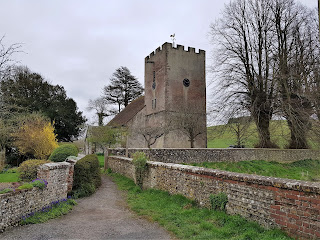Singleton is a village north of Chichester in West Sussex, about an hour from where I live. It's best known for the Weald and Downland Living Museum, which covers a big area full of medieval vernacular buildings painstakingly transported from their original sites and re-erected, with all the proper furnishings. Cottages, barns, mills, the lot. It's often seen on TV, whenever an authentic backdrop is needed for an historical programme or drama - something humbler than a castle, palace or lord's hall.
I imagine that most people go straight to the Museum, and never have a look around the village itself. They should. There is, for instance, an ancient church, which I had a look at yesterday. Here it is, tucked away where you'd never see it, if merely driving through.
To the casual eye, country churches all look much the same inside and out. But it's not true. They are all individual, each a time capsule of local social history going back centuries, as well as a place where religious services take place. Almost always, there will be something to intrigue the architectural or artistic imagination, and excite the photographer. There's also the atmosphere, which is nearly always a calming and contemplative one.
I generally view these places when nobody else is there, when I can look it over properly, and peer into corners, without feeling that I'm being watched and ought not to be doing what I do. I don't think the church minds; I think it's glad to have an appreciative visitor. And it doesn't matter that I'm devoid of any faith, and profess no beliefs. I walk around quietly and with respect, and never feel that taking photographs of anything beautiful or remarkable is being profane.
It never seems a lonely business, even if it's late afternoon and the interior is dim. I've never yet explored a church that made me feel uncomfortable or uneasy, although that's bound to happen one day. I can imagine a curious combination of shadows, or malevolent-looking gargoyles, or odd background noises, that will give me a fright and make me beat a hasty retreat, never to return.
Yes, there are noises sometimes. Usually nothing you can pin down. Perhaps a low hum or murmuring that must somehow be caused by the wind outside - or at least I suppose so. Death Watch beetles are supposed to make odd tapping noises, but I've never heard them. Nor any creaks: churches are solidly-built places, and despite all the wooden pews and other wooden furniture, they do not as a rule flex and creak like old-time sailing ships. A creak has always meant that somebody else is opening the heavy entrance door - another visitor, or a churchwarden - and I no longer have the place to myself. I might even have to explain why I'm there. Not that there's anything reprehensible about liking old country churches, and wanting to visit them.
Singleton church was noisy as soon as I stepped inside. There was a rustling, some crashing about somewhere in a far corner out of sight. Nothing disturbing about the sound, but it was a distraction. Was somebody doing some cleaning? But it didn't seem the right kind of noise for that. It seemed to move about; and be high up, not at floor level. And then I saw it: a bird. A sparrow. Or more likely a starling, as it was quite dark in colour and rather larger than the usual sparrow. It didn't like me being there. My presence was upsetting it, stressing it out. I noticed that it was blundering about, bumping into things, as if getting tired and clumsy, and perhaps working itself up into a panic. When it got caught up in the organ pipes, there was the dickens of a flapping. A bird that was cool and collected and in possession of its wits wouldn't do that. That kind of behaviour attracts cats, and is dangerous.
Poor thing. I wondered how it had got in, and what would happen to it. Would it just fly to and fro, getting ever more exhausted until it dropped? How did one in fact rescue a bird that was trapped in a church and couldn't get out? It must occur regularly. Was there a standard technique? Did churchwardens get out a big net, for instance?
The bird's noises disturbed the serenity I'd hoped to find, and I didn't linger. But I left a note about the bird in the visitor's book, which the person locking up later on was bound to see.
Perhaps by now something has been done to release the poor thing from its plight. But it's equally likely that it has brained itself, and is lying dead in one of the pews, to be discovered stiff and cold a few days from now. Sigh.


